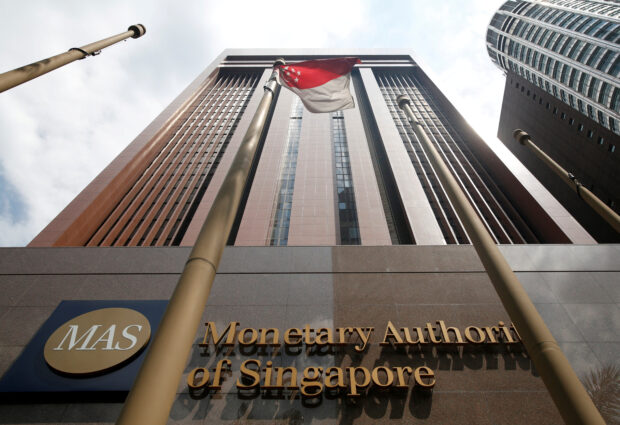Singapore keeps monetary policy unchanged as inflation slows

A view of the Monetary Authority of Singapore’s headquarters in Singapore June 28, 2017. REUTERS/Darren Whiteside/File Photo
SINGAPORE – Singapore’s central bank on Monday kept its monetary policy settings unchanged, as expected, in its first review of the year as inflation pressures continued to moderate and growth prospects improved.
The Monetary Authority of Singapore (MAS) said it will maintain the prevailing rate of appreciation of its exchange rate-based policy band known as the Nominal Effective Exchange Rate, or S$NEER.
The width and the level at which the band is centered did not change.
“Barring any further global shocks, the Singapore economy is expected to strengthen in 2024, with growth becoming more broad-based. MAS core inflation is likely to remain elevated in the earlier part of the year, but should decline gradually and step down by Q4, before falling further next year,” MAS said in a statement.
READ: Singapore seen holding monetary policy in delicate balancing act
Maybank economist Chua Hak Bin said the central bank is maintaining the current tightening bias as both core and headline inflation gauges are above 3 percent and historical comfort zones.
Core inflation in December was 3.3 percent year-on-year, slowing from its peak of 5.5 percent early last year.
MAS said core inflation is projected to ease to an average of 2.5–3.5 percent for 2024 after rising in the current quarter because of a 1 percentage point sales tax hike from January that MAS said will have a “transitory impact”.
Economic growth
Gross domestic product (GDP) was up 2.8 percent on a yearly basis in the fourth quarter of last year, according to advance estimates published by the trade ministry in early January.
READ: Singapore’s Q4 GDP growth speeds up
GDP for the full year of 2023 was 1.2 percent, and the trade ministry projects GDP to grow by 1-3 percent in 2024.
“Prospects for the Singapore economy should continue to improve in 2024,” said the MAS, although both upside and downside risks to the inflation outlook remain.
OCBC economist Selena Ling said that suggests the MAS is on an extended policy pause for now.
“April monetary policy is likely another hold and the earliest window for an easing could only come later in the year when core inflation eases more convincingly,” she said.
Monetary policy
The MAS policy decision on Monday was the first under its new review schedule, in which the central bank will make policy announcements every quarter instead of semi-annually.
The central bank left monetary policy unchanged in April and October last year, reflecting growth concerns, having tightened policy at five consecutive reviews prior to that.
As a heavily trade-reliant economy, Singapore uses a unique method of managing monetary policy, tweaking the exchange rate of its dollar against a basket of currencies instead of domestic interest rates like most other countries.